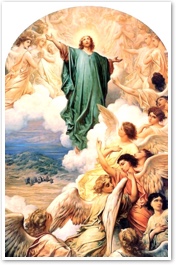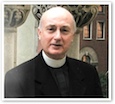The Unveiling of His Divinity
- FATHER GEORGE W. RUTLER
Like two bookends, Jesus speaks of his "hour": at the beginning of his ministry at the wedding in Cana (John 2:4), and at the end when he says that his hour has come "to be glorified" (John 12:23).
 That hour of glorification is the unveiling of his divinity, since when he became truly human he never abandoned that divine nature. It was glimpsed at his Baptism and at the Transfiguration. At the Last Supper, he spoke of his glory as something that was already there and would soon become visible: "Now has the Son of Man been glorified, and in him God has been glorified. If God has been glorified in him, God will in turn glorify him in himself, and will glorify him very soon" (John 13:31-32).
That hour of glorification is the unveiling of his divinity, since when he became truly human he never abandoned that divine nature. It was glimpsed at his Baptism and at the Transfiguration. At the Last Supper, he spoke of his glory as something that was already there and would soon become visible: "Now has the Son of Man been glorified, and in him God has been glorified. If God has been glorified in him, God will in turn glorify him in himself, and will glorify him very soon" (John 13:31-32).
Watching the Ascension, frail human eyes had a hard time processing that glory in the intellect. The description grasps for words to describe what is beyond familiar physical formulas: ". . . he was lifted up, and a cloud took him from their sight" (Acts 1:9).
His departure would make him more vividly present. It was not like people on the dock waving wistfully to passengers on a departing ship while the band plays "Now is the hour when we must say goodbye." I remember that scene from the days when the great ocean liners pulled out from the piers down the street from our church. Christ is no longer limited by space, so his Church can be everywhere with him present on every altar. There is then a paradox of glory: as Christ leaves he says, "I am with you always, until the end of the age" (Matthew 28:20).
This is the treasure and confidence of the Church in times when the presence of Christ seems obscured by tragic events and vain people. The beloved apostle John described the Ascension to Polycarp, who became bishop of Smyrna in Turkey, a city whose architecture can be seen today on the Internet reconstructed by computer-aided design. Before Polycarp passed along John's description to Irenaeus, who became bishop in Lugdunum (present-day Lyons in France), he wrote:
"The faith and the tradition of the churches founded in Germany are no different from those founded among the Spanish and the Celts, in the East, in Egypt, in Libya and elsewhere in the Mediterranean world. Just as God's creature, the sun, is one and the same the world over, so also does the Church's preaching shine everywhere to enlighten all men who want to come to a knowledge of the truth.
Now of those who speak with authority in the churches, no preacher however forceful will utter anything different — for no one is above the Master — nor will a less forceful preacher diminish what has been handed down. Since our faith is everywhere the same, no one who can say more augments it, nor can anyone who says less diminish it."
 This is Meaghen Gonzalez, Editor of CERC. I hope you appreciated this piece. We curate these articles especially for believers like you.
This is Meaghen Gonzalez, Editor of CERC. I hope you appreciated this piece. We curate these articles especially for believers like you.
Please show your appreciation by making a $3 donation. CERC is entirely reader supported.

Acknowledgement
 Father George W. Rutler. "The Unveiling of His Divinity." From the Pastor (May 1, 2016).
Father George W. Rutler. "The Unveiling of His Divinity." From the Pastor (May 1, 2016).
Reprinted with permission of Father George W. Rutler.
The Author
 Father George W. Rutler is the pastor of St. Michael's church in New York City. He has written many books, including: The Wit and Wisdom of Father George Rutler, The Stories of Hymns, Hints of Heaven: The Parables of Christ and What They Mean for You, Principalities and Powers: Spiritual Combat 1942-1943, Cloud of Witnesses — Dead People I Knew When They Were Alive, Coincidentally: Unserious Reflections on Trivial Connections, A Crisis of Saints: Essays on People and Principles, Brightest and Best, and Adam Danced: The Cross and the Seven Deadly Sins.
Father George W. Rutler is the pastor of St. Michael's church in New York City. He has written many books, including: The Wit and Wisdom of Father George Rutler, The Stories of Hymns, Hints of Heaven: The Parables of Christ and What They Mean for You, Principalities and Powers: Spiritual Combat 1942-1943, Cloud of Witnesses — Dead People I Knew When They Were Alive, Coincidentally: Unserious Reflections on Trivial Connections, A Crisis of Saints: Essays on People and Principles, Brightest and Best, and Adam Danced: The Cross and the Seven Deadly Sins.


